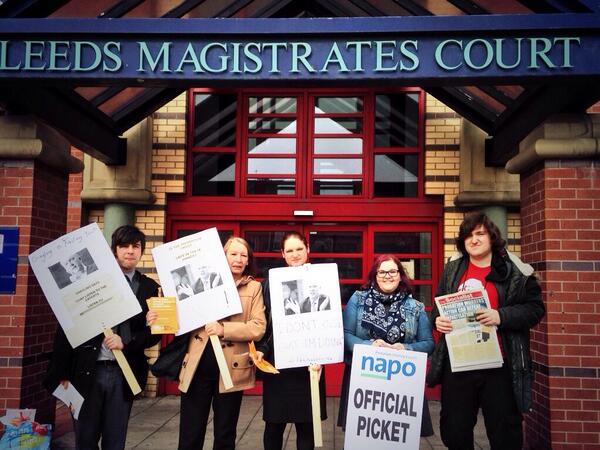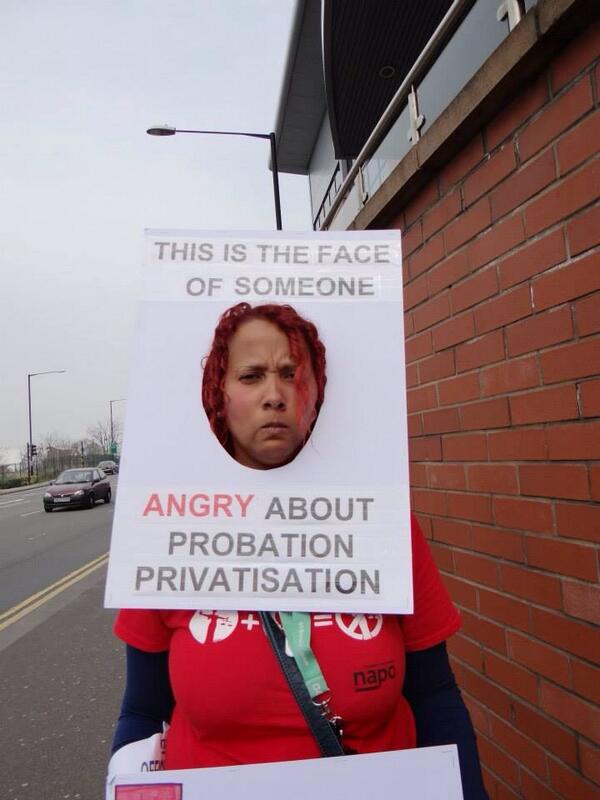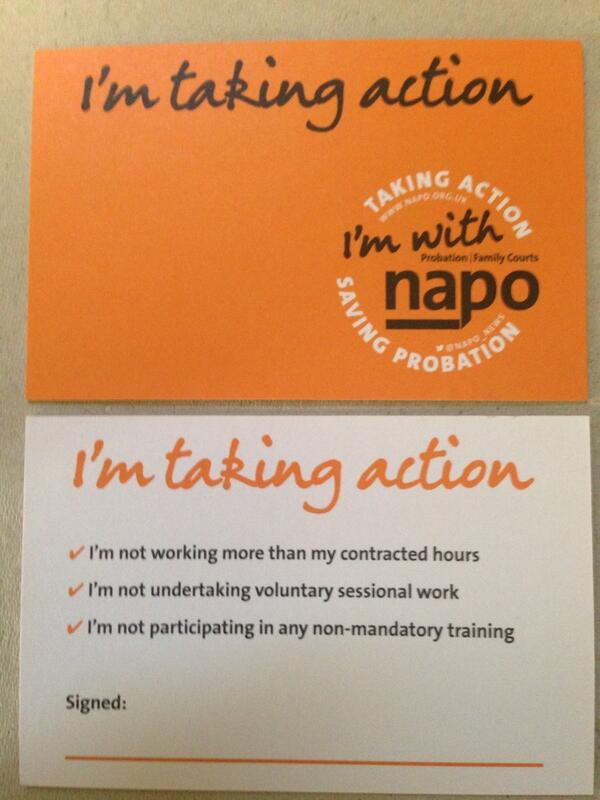
















An attempt to help explain the mysteries and magic that are part and parcel of 'probation'.
Pace of Sell Off
The All Party Justice Committee became the latest group on March 25th to express concern at the pace of the Transforming Rehabilitation agenda. MPs demanded clarification of the exact date of the take over of the new providers of supervision. Was it Autumn 2014 or spring 2015? They also asked whether or not the unions had signed off a post sale package and by implication the sale itself. The unions remain as ever 100% opposed to the sale. Problems continue to emerge most days with the timetable.
The faster the pace the more likely the chance of errors. Over the last few days staff have learnt - that MAPPA eligible's were not included in the caseload calculation (and there are about 10,000 in that group), glitches occurred in staff accessing the Risk of Serious Recidivism tool, the main IT system is not suitable for AT users, report writing will take longer and there are insufficient staff to maintain the flow of reports to the courts anyway.
The full implications for TR of Buddi pulling out of the £300 million tagging contract for hardware are becoming apparent: a) the timetable for the huge increase in tagging is behind what was hoped b) it is another example of a contract being let in an over hasty way c) bidders may start to think that what they believe they are after and what they will get are rather different. The Coalition had hoped to have the new traditional tag plus GPS tracking in place by mid 2015 with an increase from the current numbers tagged on a given day rising fro 26,000 now to at least 75,000 by 2020.
Over 20 parliamentary Questions drafted on behalf of Napo by Harry Fletcher on court chaos and tagging have been tabled via Justice Union MPs. At least 15 members of Parliament have written to the MOJ about different aspects of TRs progress. Many more will follow.
The Future
The strategy for slowing and defeating TR remains unchanged. It is a combination of Parliamentary action, legal challenges and industrial action. Legal opinion is needed and sought over a number of issues; the validity of using the Offender Management Act 2007 to avoid legislation, risk registers, the timetable and risk to the public, consultation with staff over transfer and allocation and the test of recklessness.
In Parliament questions both written and oral will continue, debates will be requested, points of order will be raised, EDMs will be placed and lobbying must continue. During the next 6 months all Probation staff should be sending to a central point details of their observations and experiences. They must then be published both in Parliament and the media.PS - on twitter Harry poses this key question:-
Rather than signalling the end, it’s the beginning of a new phase in which we can start to see our predictions become reality – and speaking personally, the more I find out and the more my team and I try to work out how we’re actually going to do this, the more holes and problems we can see. But now they’re becoming more than anecdote. They’re going to have a real, measurable impact in the real world.
Yes, it’s going to be hard. It’s going to be awful, and we’re going to have so much more pressure put on us. But we can use this. This is the time when the wheels really start to come off. I think it’s important that this phase in the project is going to be marked with the industrial action Monday and Tuesday – a reminder that WE are all in this together, solid ground we can fight from in this sea of uncertainty.
Napo wants to hear from members on this, as per the link to Jim’s post above. I think we also need to hear from our friends across the justice system. If you notice changes in probation, if problems come up that are potentially linked to the new system, please help us by talking to us about it. Talk to officers in court, your local Napo branch, or contact campaigns@napo.org.uk. Talk to us on twitter or blogs, and we can pass your information on, maybe enlighten you a bit more abut the reasons for problems too. Let’s keep talking, keep working together.
On that note, I look forward to seeing plenty of you on Tuesday at the Justice Alliance demo – meet 2:15pm, Old Palace Yard, opposite Parliament. There’s a rally in Cardiff April 1st, 12:30pm, at the Aneurin Bevan monument on Queen Street, and plenty of other local events across England and Wales. Check your local Napo branch’s twitter feed for information, or www.napo.org.uk. Picketing will be taking place at probation offices and courts from 12 noon on Monday 31st.The full blog post 'The Plural of Anecdote' can be found here and is well worth reading. Finally, I saw this on the Napo Forum and rather liked it's simplicity:-

Prison officials have dismissed reports of a "stand-off" between guards and inmates who reportedly took control of a wing on Friday. They confirmed a “disturbance” had taken place, but called the suggestion of a stand-off between inmates and guards "speculation". There were no reports of any injuries. The incident broke out at the HMP Northumberland, in Morpeth, at about 7.30pm on Friday.
Steve Gillan, general secretary of the Prison Officers Association, told the BBC that prisoners had taken control of an area. “We do not know what has sparked this major incident, but I do know that 50 plus inmates have taken over a wing,” he said on Friday evening. “We have teams from other establishments trained to deal with riots on their way. There is concerted indiscipline and our officers will try to contain it.”
The trouble broke out after prisoners refused to go back to their cells, the BBC said, while police were put on standby ready to assist. A spokesman for Sodexo, which operates the prison, said the situation had been resolved. He said: “We can confirm there was a disturbance at HMP Northumberland. It was confined to part of one wing of the prison and has now been resolved. We will carry out an investigation into this incident.”
HMP Northumberland houses around 1,350 inmates and is a category C prison, for inmates convicted of less serious crimes who cannot be trusted in open conditions but who are unlikely to make a determined attempt to escape. Private firm Sodexo Justice Services took over the management of the prison in December last year.This insecurity is happening in lots of jails, including those public sector prison service jails that have been benchmarked. A few hot days in the summer and all could go up.
I have been a member of CBA Exec for three years now. I regret that the time has come when I can no longer remain a member.
The CBA took a momentous decision this evening, to take Grayling’s offer to shelve the cuts to the AGFS until 2015, and to enter into talks about the VHCC regime, and in return to call off the industrial action. In my view it was entirely the wrong decision, short-sighted and unnecessary, and one I cannot stand, or defend. We have allowed Mr Grayling, who was ‘on the ropes’ to divide and rule us. ‘Us’ in this context means, first of all, 41 fellow criminal practitioners who courageously blazed a trail for the CBA by taking direct action on 2nd December, returning their briefs when, at that point, the criminal Bar had never taken direct action, and they could not have known whether it ever would. Their courage was an example to us all, and we should not underestimate the value to the rest of us of the step they took. Grayling did not believe – probably because he was badly advised – that barristers would ever ‘go on strike’ but those 41 did. And because they did, Grayling took seriously your threat to refuse to do AGFS cases if the pay for those was cut. Our thanks to those 41 is to say “Well, we’ve sorted out a deal that spares the remaining 6,959 of us who only do AGFS cases. Good luck with your own small battle.”
Why did we feel the need to take Grayling’s first offer? I simply don’t accept that he was in any position to dictate terms: “This is only on the table until Friday. Take it or else” Or else what? Two weeks ago, the fee cuts were “ cast in stone”. The man is a p*ss and wind merchant, but, as it transpires, a very good one; one whom we have allowed to bully us when there was absolutely no need. The fact of the matter is (or was) that WE were the ones who held the whip hand. We could have demanded, as the price of calling off the direct action, at the very least, the restoration of VHCC rates as well as a stay (which is all it is) in relation to AGFS. He would have had no choice but to agree. We have demonstrated to him our industrial muscle, and he is (or was) running scared.
I say “ at the very least” because even that would have been a disastrously bad deal for the criminal Bar in the longer term. I am talking about, of course, our abandonment of the solicitors’ profession. Paul Mendelle spoke about the unforeseen after-effects of the Carter settlement in 2007. I was part of the Bar Council’s negotiating team, and at the time, we thought we had done a very good deal on behalf of the Bar. We were very pleased with ourselves. The solicitors were poorly–organised in their response to Carter, and as a result, in 2008, had to move onto a system of graduated fees – the LGFS – which provided, by comparison with the AGFS, and more particularly with the EPF taxation they had previously enjoyed, meagre pickings. We (the BC team) simply did not foresee what would happen next – that solicitors, who of course get the client in through their door first – would see the AGFS as the way of making up the shortfall. As we all know, the result has been an explosion of in-house solicitor-advocates, decimating the work available for the junior Bar.Finally, on the eve of fresh industrial action by Napo, the Criminal Justice Alliance and reportedly some dissident barristers, this by regular contributor Papa is worth highlighting I feel:-
Dear All
campaigns @ napo Thank you to all those who have returned the questionnaires and sent emails in to the campaigns@napo.org.uk mail box. This is providing us with vital evidence with which to challenge TR. We’d be grateful if you could use the questionnaire format because this makes it easier for us to collate the information. We have identified a QC to meet with next week to discuss how we can advance our intention to mount legal challenges. Please keep the evidence coming in. Vacancies Reports we are getting from branches about vacancies are nothing short of scandalous. NPS vacancies being ring-fenced to those already assigned to the NPS is discriminatory. The NPS does not exist yet and has no legal status until the 1st of June 2014. Some senior staff are working for Trusts and the NPS/CRC in what amounts to a clear conflict of interest. Vacancies are being filled without fair and open competition. Please send in as many examples as you can and we will obtain legal advice on this as early as we can next week. This dodgy behaviour is a direct result of the chaos and disarray caused by the staff and case split. NOMS has no idea what it’s doing and as the wheels come off, our case gets stronger and stronger. The Justice Select Committee We were advised, quite late on the day before this weeks session, that Chris Grayling had written to the Justice Select Committee (JSC) giving a deliberately misleading impression of the TR programme. I refuted that in the strongest terms to the JSC and, along with Ben Priestley from Unison and David Walton from GMB, we have written a joint letter setting out our concerns directly to the Ministers demanding a meeting. Please find the correspondence attached. In appearing before the JSC, Jeremy Wright was still peddling the line that the unions had agreed to TR but was magnificently challenged by members of the Committee. While we withdrew local disputes pertaining strictly to the lack of a framework agreement in order to negotiate, many branches remained in dispute over the staff split and other issues. Jeremy Wright was embarrassed in front of the Committee as he was asserting that disputes simply did not exist. John McDonnell MP questioned the Minister saying, “What do you mean they’ve agreed? They’re all taking industrial action next week!”. Let’s have a great turn out and show the government that this isn’t over yet. Not by a long way.
JUSTICE03AaGovrnmentResponseCr
IAN LAWRENCE General Secretary |
Civil war broke out among criminal defence lawyers yesterday in the wake of a deal struck between the government and the Criminal Bar Association. The Criminal Law Solicitors Association (CLSA) accused the Bar’s leadership of using “the unity of the profession to pursue self-interest in a separate secret negotiation”. As a result of the agreement, the CBA has suspended its direct action: the ‘no returns’ policy which meant that barristers would not accept briefs where the original advocate has had to return it, and the refusal to handle very high-cost cases (VHCCs) since fees were cut 30% in December, which 41 barristers have already done. In return, the government has agreed to suspend the 6% cut to the Advocates Graduated Fee Scheme until after next year’s election and take account of the recommendations of the various ongoing reviews of the criminal justice system and criminal advocacy.
CBA chairman Nigel Lithman QC said: “This gives 89% of the criminal Bar (those that do not do VHCCs) what they have demanded and has been achieved by their resolve.” On VHCCs, he said that “whilst it is for each individual barrister to choose what work they undertake, there is no objection in principle to barristers who want to work on VHCCs undertaking such cases if they choose to do so”. Mr Lithman welcomed the government’s agreement to work with the profession to consider better alternatives to the VHCC scheme, adding at the end of his statement that “the CBA remains supportive of the stance taken by solicitors”. The only concession offered by the government to solicitors was that an interim payment scheme – aimed at helping firms’ cash flow – will be introduced this summer, a year earlier than planned, at a cost of £9m.By doing a separate deal with the barristers it looks like Grayling has just made the solicitors more determined and most certainly 'up for it' on Monday and Tuesday. Talking of Grayling, the prisoner book ban continues cause him loads of bad publicity from all parts of the political spectrum and now includes HM Chief Inspector of Prisons Nick Hardwick. Here he is talking to the Independent:-
The Government's blanket ban on books being sent to prisoners is a “mistake” and the policy should be changed, the Chief Inspector of Prisons has said.
In an interview with The Independent, Nick Hardwick said preventing harmless items such as books from entering the country's jails was unnecessary “micro-management” by politicians. Decisions on what prisoners can receive from outside should be left to the discretion of individual prison governors, he added. His comments will come as a blow to the Justice Secretary, Chris Grayling, who has so far dismissed growing objections to the policy, saying he is determined to bring “right wing solutions to bear on social problems where the Left has palpably failed”.
Mr Hardwick said that while the basic intention of the Government's policy was “sound”, aspects of the Incentives and Earned Privileges (IEP) scheme - which places strict limitations on what prisoners can receive in the post and keep in their cells - were “not sensible” and “haven't worked out in the way ministers intended”.
“The problem in this case… is trying to micro-manage this from the centre, with the centre describing very detailed lists of what prisoners can and can't have,” he said. “I think that's a mistake. I think that once the policy intention is clear, how that's implemented should be left much more to the discretion and the common sense of governors, so that they can reflect the needs of their particular prison population.” Mr Grayling has come under mounting pressure to re-examine the policy since the issue was raised earlier this week by Frances Crook, the chief executive of the Howard League for Penal Reform, in a critical article for a political website.
Her comments were picked up by author Mark Haddon, who galvanised Britain's literary establishment to speak out in protest. On Tuesday Alan Bennett, Sir Salman Rushdie, Julian Barnes, Ian McEwan, Carol Ann Duffy and other respected writers signed a letter condemning the ban.While on the subject of Grayling, here he is in the Guardian talking about judicial review and campaigning groups:-
Campaign groups are undermining parliament by launching too many court challenges aimed at overturning government policy and avoiding costs by hiding behind "human shields", the justice secretary has said. In his clearest rationalisation so far of why judicial review cases should be limited, Chris Grayling accused pressure groups of exploiting costly legal procedures to delay legislation, planning permissions and deportation decisions.
"We have seen [judicial review] being used as a tactical tool rather than a vehicle for an individual to right a wrong," Grayling told the House of Lords constitutional committee. "Increasingly it's being used a political campaigning tool. It's trying to bypass … the political process.
"We are seeing pressure groups who are there to campaign and this is one of the tools that they use. We are trying to limit the human shield strategy where a campaign group finds an individual who has no resources of their own and rows in behind them. If the case is lost, there's no risk to the campaign group itself.
"My belief is that, to a degree I find quite unacceptable, it's either being used to delay or to try to challenge … a legitimate decision taken by the government and endorsed by parliament. We have no intention of getting rid of judicial review but I don't believe it should be a campaigning tool or a delaying tool." Even claims that were turned down imposed heavy costs on government lawyers and the courts, he said.
The justice secretary's comments come as the criminal justice and courts bill, which aims to limit public funding for judicial reviews, goes through parliament. One clause introduces the novel concept that courts can refuse cases if it appears "highly likely that the outcome for the applicant would not have been substantially different if the conduct complained of had not occurred". Critics have warned that it will force judges to engage in abstract speculation.There really is no doubt where a chap like Grayling is coming from. It was a few weeks ago, but here he is telling the Civil Society website that charities do too much campaigning and should just get on with being like businesses:-
The charity sector is putting too much emphasis on campaigning and not enough on service delivery, Justice Secretary Chris Grayling told an audience of charity leaders last night. Speaking at a social welfare debate in London, organised by the Lord Mayor’s Charity Leadership Programme, Grayling said there was currently discussion about how much weight should be given to three issues – contracting, fundraising and campaigning.
“I disagree strongly with the campaigning side,” he said. “People talk about the amount MPs are lobbied by big business. But I would say that there is 20 to 30 times as much lobbying from the charitable sector, perhaps even more. I see there are big national organisations with active, well-funded campaigning groups at the centre, but with cash-strapped branches trying to provide services on the ground in communities, and I think 'are you sure you've got the balance right?'
“From the point of view of a constituency MP it doesn't feel right at all.” Grayling also said that the sector had to adapt in order to contract with government.
“The sector itself has to behave a reasonably commercial way,” he said. “If you want to win a government contract, you’ve got to be able to do a genuine business deal. We try to facilitate opportunities for the sector but we can't provide it on a plate.” He said the lesson he had taken from the Work Programme and Transforming Rehabilitation was that the sector needed to build more commercial skills, and that he had explained this lesson to Acevo, the NCVO and to contracting organisations. He said that change was inevitable for charities, because previous government methods of engaging with the sector had been too inefficient.
“In both of these programmes the social sector is enormously important, both for big organisations like Tomorrow's People and the Shaw Trust, and smaller niche organisations,” he said. “We've tried to create a level playing field.” But he said the sector also had to change to meet government’s needs.
“Before the Work Programme the Department for Work and Pensions contracted with 1,200 charities,” he said. “With the best will in the world that's not really terribly viable. It's much more difficult to manage large numbers of charities.”
Grayling said he did not agree with criticism from members of the audience who said they could not afford to become involved in payment-by-results programmes which took a long time before they paid out to contractors. “I don’t believe payment-by-results puts any constraints on the sector,” he said.
He said that charities should be able to get funding from prime contractors who had the balance sheet to fund smaller organisations during delivery, or they should be able to attract social investment to fund a payment-by-results contract.But lets end this on yet another health warning to all potential bidders for probation work out there, and I do understand that your number is getting smaller by the day:-
The firm Atos, which assesses whether benefit claimants in Britain are fit to work, is to finish its contract early, ministers have confirmed. It follows government criticism over "significant quality failures". Disabilities Minister Mike Penning said a new company would be appointed in early 2015, and Atos would not receive "a single penny of compensation".
Atos had been due to finish in August 2015. It said the settlement was "in the best interests of all parties". It also said it would "work hard to support transition to a new provider", adding: "We will be transferring our infrastructure and employees to ensure consistency of service to those going through the process. "There will be no change for those applying for Employment and Support Allowance." Last month, Atos said it was seeking to end its government contract under which it carried out the Work Capability Assessments.
In the past few months the Justice Secretary Chris Grayling has been rapidly diminishing the regime for people in prison. Last year he ordered all new prisoners back into prison uniform, then he stopped prisoners having Christmas presents sent in from their families. He has meddled with the Incentives and Earned Privileges Scheme so that prisoners who want to achieve the “enhanced” level of imprisonment – i.e. an extra visit a month, a better cell, a bit more money to spend from their private cash – have to do “over and above” just being well behaved. (A particularly niggardly move as he knows full well that so called “purposeful activity” in our prisons is becoming as elusive as the evidence that his other big idea, “Payment by Results” will actually work.)
More recently he has decided to restrict ROTL – Release on Temporary Licence – because of several high profile failures – yet last year there were almost half a million successful releases from prison on temporary licence. Nastiest of all of Grayling’s interference with the running of prisons however is his decision to ban prisoners from having books sent in and – incredibly – writing materials. These moves apparently are supposed to somehow magically “Transform Rehabilitation” and lead to a reduction in reoffending – yet a more illogical approach to the problem of recidivism would be hard to find.
This week he admitted that the system he presides over was “very flawed” and that the consistently high reoffending figures for released prisoners (costing the economy between £9bn and 13bn a year according to the office for national statistics) – was a “crazy situation.” Mr Grayling talks about “rehabilitation” on the one hand and yet treats people in prison like his own personal political pawns on the other. The fact is, it is the Justice Secretary’s rhetoric that is “crazy” and his determination to involve himself in the decisions which dictate the quality in the minutiae of prison landing life which is “very flawed.”
Commenting on Grayling’s decision to ban books being sent to prisoners Frances Crook, the Director of the Howard League for Penal Reform said: “Over the last year, because of shrinking prison budgets, staff cuts and increasing numbers, prisoners have been spending even longer in their cells without access to facilities such as libraries. It is common for prisoners to spend 20 hours a day in their cells during the week. At weekends they can be cooped up from Friday lunchtime until Monday morning. Conditions have deteriorated so much in recent months that this has become a major concern.
“Being able to read a book is a lifeline and a way of nourishing the mind. As families and friends are now forbidden from sending basic items into prison, prisoners are sitting in stinking cells, wearing dirty clothes, with nothing to do and not even a book to read. We urge the government [i.e Mr Grayling] to reconsider this draconian measure.”
If he really has the interests of future potential victims of people coming out of prison he really should reconsider all of the above.Grayling is so rattled he rushed out a feeble press release yesterday in response to the Change.org petition:-